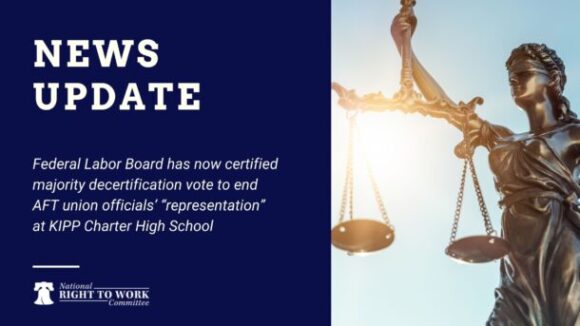Will Team Biden Weaponize Workers’ Pensions?
Big Labor abuse of worker pension and benefit funds as a means of advancing union bosses’ self-aggrandizing policy objectives is a familiar phenomenon.
On Monday, raisin farmers and handlers Marvin and Laura Horne finally prevailed in a long battle they have waged in defense of what a U.S. Supreme Court majority now agrees is their constitutional right to sell raisins in interstate commerce without being forced to fork over a portion of their crop to the so-called Raisin Administrative Committee (RAC).
In a federal case that was heard by the High Court twice, most recently in April, the Hornes challenged the constitutionality of the Agricultural Marketing Agreement Act (AMAA) of 1937 as it affects them and their business. They contended that the U.S. Department of Agriculture (USDA) could not licitly collect accumulated bills and fine them for having refused for years to fork over a portion of their crop, a requirement authorized by the AMAA.
The vast majority of Americans who hear about the Horne case are likely to agree with the High Court majority that the commandeering of what Chief Justice John Roberts, the majority opinion’s author, punningly referred to as “the fruit of the growers’ labor” is unconstitutional as well as unjust. But the AMAA is hardly the only New Deal-era law under which labor’s fruits have been and are being commandeered.
Just as the AMAA empowered “federal marketing orders” such as the RAC to confiscate produce from farmers in order to prevent “too much” fruit or “too many” vegetables from being sold in the domestic private-sector marketplace, the National Labor Relations Act (NLRA) and the Railway Labor Act (RLA) empower union officials to impose productivity-quashing work rules on union members and nonmembers alike.
Moreover, under the NLRA and the RLA, workers who may not think they benefit from such work rules are frequently forced to fork over dues or fees to the union acting as their “exclusive” bargaining agent, just as the Hornes were ordered to turn over a portion of their raisins to government agents.
The AMAA empowered the USDA to establish elected boards of bureaucrats such as the RAC to require that producers surrender a portion of their annual crop. How much handlers were required to surrender depended on the estimated size of the entire U.S. raisin crop in any given year. The confiscated raisins were temporarily or permanently taken out of the commercial domestic market.
In Monday’s majority opinion in Horne v. USDA, Roberts, joined by seven other justices, found that the RAC’s forcible appropriation of raisins without “just compensation” was impermissible under the Constitution’s Takings Clause. Four other justices agreed with Roberts that, because the taking in this case was “physical” rather than merely “regulatory,” the Hornes are not liable to pay any of the fines that were levied against them. The sole dissenter, Obama appointee Sonia Sotomayor, denied that any unconstitutional taking had occurred. (The majority opinion, two concurring opinions, and the dissent are all available at the link below.)
In the opinion of the court, Roberts argued that, while the Hornes’ means of livelihood is “certainly subject to reasonable government regulation,” the freedom to sell raisins in interstate commerce is “not a special governmental benefit.” The federal government, Roberts continued, may not hold growers’ freedom to sell the fruit of their labor “hostage, to be ransomed by waiver of governmental protection.” Moreover, contrary to Sotomayor’s claim, allowing the owners of the confiscated raisins to retain “some vestigial or theoretical stake in the disposition of their property,” as a Wall Street Journal editorial regarding the Horne decision put it, does not suffice to render an otherwise unconstitutional taking constitutional.
In practice laws often have unintended consequences, and producers like the Hornes have good reasons to believe they would be better off with free competition than they are with the government’s heavy-handed “help.” (In a footnote to her dissent, Sotomayor explicitly stated that the judiciary should simply accept at face value the executive branch’s contention that the Hornes “benefit” from selling raisins in a government-manipulated market, regardless of what the Hornes think.) And certainly some employees do believe they benefit from the very competition union bosses suppress with restrictive work rules.
Now that a High Court majority has found the AMAA as implemented to be unconstitutional, not to mention counterproductive, perhaps the days of the NLRA and the RLA may also be numbered.

14-275 Horne v. Department of Agriculture (06/22/2015)

Big Labor abuse of worker pension and benefit funds as a means of advancing union bosses’ self-aggrandizing policy objectives is a familiar phenomenon.

What impact does handing a union monopoly power to deal with your employer on matters concerning your pay, benefits, and work rules have on your pay?

Federal Labor Board has now certified majority decertification vote to end AFT union officials’ “representation” at KIPP Charter High School